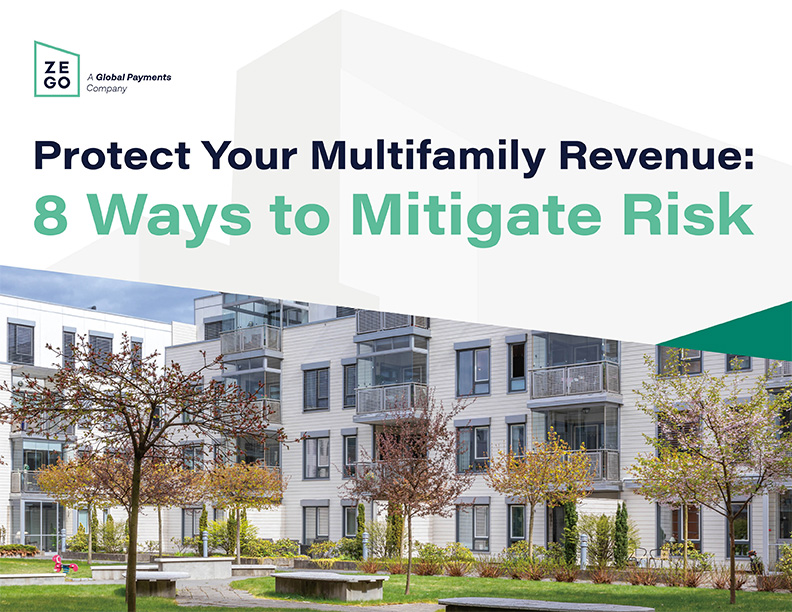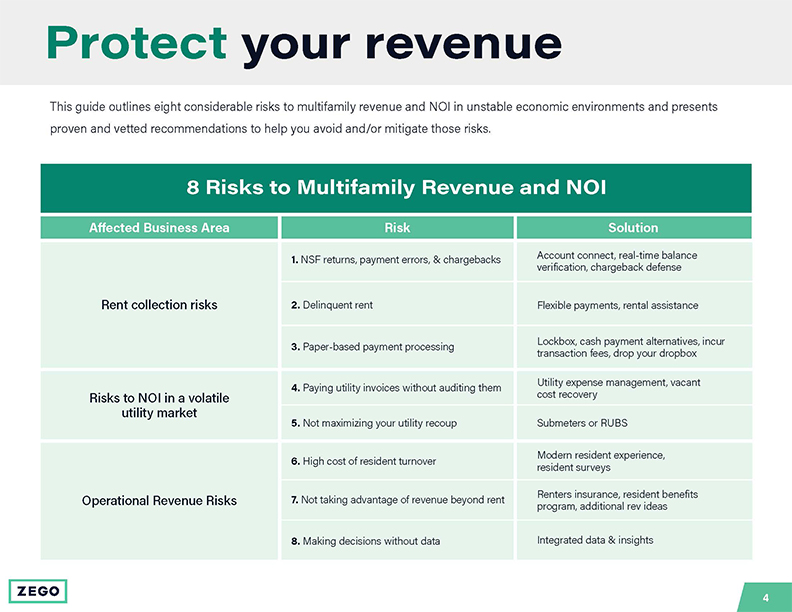Protecting resident rent payments: how to find a secure payment solution
Find out what your payment solution needs to protect rent payments and personal information
Processing rent payments is the most important part of your business. And since many renters want to pay digitally, that process has to be entirely secure. You have to offer a secure platform that protects their personal information and ultimately, your revenue.
This is hard for most companies to manage solely on their own. So the most effective way to prevent any risks is to use a reputable payment provider.
Unfortunately, not every rent payment software has proper security and compliance. Taking the best security measures is a considerable expense. And sometimes, companies that are looking to cut costs aren’t fully investing in security.
However, security breaches can be a disaster to your company – both financially and for your reputation. So it’s critical that you use a payments processor that is committed to security.
Essential security features for rent payment software
If you’re offering online payments of any kind, certain security standards are a must. From tokenization, encryption, and latest advancements in data security, here are the essential features.
- Payment card compliance: PCI Level I & II compliance are the highest standards of security for companies who process, store, or transmit credit card data.
- Infrastructure Security: You want a processor to be SSAE 18 compliant. Companies who are SSAE 18 compliant have undergone a rigorous audit about security controls and privacy by The American Institute of Certified Public Accountants (AICPA)
- Data Security: 256-bit SSL is the gold standard for data security and is one of the most secure encryption methods.


FREE GUIDE
Protect Your Multifamily Revenue: 8 Ways to Mitigate Risk
With potential economic challenges looming, protect your business with proactive steps and proven recommendations against chargebacks and returns, utility theft, growing resident turnover costs, and more!
What should I ask a payment provider about security and compliance?
Compliance and security are complex matters. So you might not know the right questions to ask to find out if a company prioritizes security. Here are some questions that will help you understand a potential vendor’s security standards.
- What is your underwriting and due diligence process?
- Do you have ongoing monitoring & risk controls in place?
- Will cardholder data be stored locally on my servers or safely in the cloud?
- Do you have your own gateway?
- What is your deposit and reversal timing?
- Do you have a seamless integration with your current accounting system, ERP, or eCommerce shopping cart?
- Do you have in-house customer service which supports the gateway, integration, and merchant account?
Staying in compliance with payment regulations
Security is always a concern for businesses that accept online payments. A secure payment system is needed to protect customer information from fraud and data theft.
But sometimes situations occur that may raise red flags to your payment processor. So it’s up to you to avoid situations that may cause an interruption in service. Whether it’s withheld funds, a freeze on processing, or account termination, these scenarios are a nuisance at best, and devastating at worst.
Here are some tips to keep you in compliance and avoid situations that may interrupt your business operations.
- Ensuring your company stays in compliance and out of risk when processing payments. Be very transparent with your payment processor about your company setup. For instance, explain who owns/has access to the properties bank accounts. You also need to explain what kinds of funds are being collected: rent, renters insurance, pet rent, etc.
- Communicate important changes! Notify your payment processor of any ownership changes, legal name, tax ID changes, and executive level staff changes.
- Don’t mix side hustles in with your account. If you have multiple types of businesses, check with your vendor to see what is allowed inside that processor’s scope of processing. Any transactions out of scope could result in an entire account termination.
- Bringing in more revenue than usual? You’ll want to check in with your payment processor. They may need supporting documentation of any rents or ancillary charges that put you over the threshold. You may need to apply for limit increases to support your tenant base.
- Keep documentation for any in-office and phone payments as well as previous resident payment history. This will be very handy for fighting chargeback or fraud cases.
- Always make sure to promptly remove user accounts for any staff members at their termination. This prevents processing mistakes and potential theft or fraud.
Why does a payment processor want my personal information?
Sometimes people are surprised to learn how much personal information their vendor requires about certain members of the company. Why is this? This is because of Know Your Customer (KYC) requirements.
In the past, financial institutions weren’t required to know the identity of the individuals who owned or controlled their customers. As a result, this fostered a lot of illegal activity, such as money laundering. Customers who wanted to hide illegal money were able to access the financial system anonymously.
Now there are new rules designed to prevent illegal and harmful activities. These new requirements are called Know Your Customer (KYC). As such, some personal data is required to process online transactions. KYC rules apply to anyone that has a 25% or more beneficial ownership interest in the customer entity. If this applies to you, here’s what you will have to provide:
- Full name
- Home address
- Drivers’ License Number and Issuing State
- Date of birth
- Social Security Number
- Title of individual
- The percentage of ownership in the customer entity of the individual
It is important to note that providing personal information doesn’t mean you are assuming any financial liability for your company. This requirement purely ensures that business owners are actual people and not shell companies or fronts for illegal organizations.
Want more advice for securely protecting rent payments?
Zego’s payment solution is one of the most-trusted in the property management industry. To learn more, set up some time for a 1-1 consultation.
Safeguard your rent payments
At Zego, we offer the highest levels of security available and can help you minimize risk when processing digital payments. Protecting your residents, we adhere to strict compliance rules and best practices that are designed to protect and safeguard customer data.